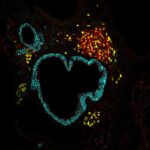
Publication: Glucocorticoids and the cytokines IL-12, IL-15, and IL-18 present in the tumor microenvironment induce PD-1 expression on human natural killer cells.
Publié dans: J Allergy Clin Immunol 2021 Jan; 147(1): 349-360
Auteurs: Quatrini L, Vacca P, Tumino N, Besi F, Di Pace AL, Scordamaglia F, Martini S, Munari E, Mingari MC, Ugolini S, Moretta L
Résumé
Programmed cell death protein 1 (PD-1)-immune checkpoint blockade has provided significant clinical efficacy across various types of cancer by unleashing both T and natural killer (NK) cell-mediated antitumor responses. However, resistance to immunotherapy occurs for many patients, rendering the identification of the mechanisms that control PD-1 expression extremely important to increase the response to the therapy.We sought to identify the stimuli and the molecular mechanisms that induce the de novo PD-1 expression on human NK cells in the tumor setting.NK cells freshly isolated from peripheral blood of healthy donors were stimulated with different combinations of molecules, and PD-1 expression was studied at the mRNA and protein levels. Moreover, ex vivo analysis of tumor microenvironment and NK cell phenotype was performed.Glucocorticoids are indispensable for PD-1 induction on human NK cells, in cooperation with a combination of cytokines that are abundant at the tumor site. Mechanistically, glucocorticoids together with IL-12, IL-15, and IL-18 not only upregulate PDCD1 transcription, but also activate a previously unrecognized transcriptional program leading to enhanced mRNA translation and resulting in an increased PD-1 amount in NK cells.These results provide evidence of a novel immune suppressive mechanism of glucocorticoids involving the transcriptional and translational control of an important immune checkpoint.
Lien vers Pubmed [PMID] – 32417134
Lien vers le DOI – 10.1016/j.jaci.2020.04.044

